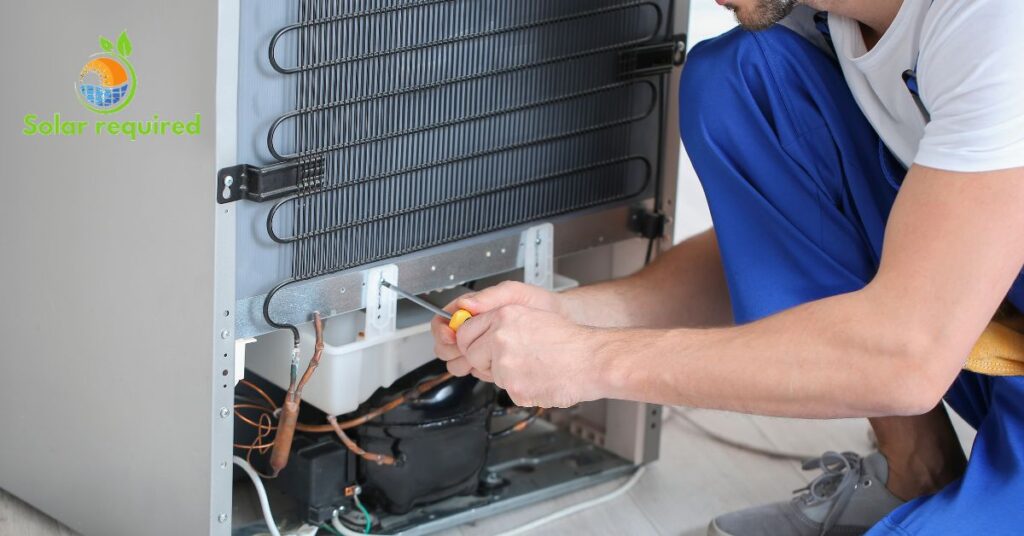What is a solar-powered refrigerator freezer?
A solar refrigerator freezer is a unique appliance. It uses solar energy to keep food cool. It does this without needing an electrical grid. It combines solar energy and refrigeration principles. It gives an eco-friendly solution for off-grid living or emergencies.
Step 1: Install the solar panels
Install the solar panels in a sunny spot. They should face the direction that gets the most sunlight all day.
Step 2: Connect the solar panels to the charge controller
Use the appropriate cables to connect the solar panels to the charge controller. The charge controller regulates the power from the panels to prevent overcharging the batteries.
Step 3: Connect the charge controller to the battery or supercapacitor bank
Connect the charge controller to the battery or supercapacitor bank. These store the energy from the solar panels.
Step 4: Connect the inverter to the battery or supercapacitor bank
Connect the inverter to the battery or supercapacitor bank. The inverter converts the stored DC power into AC power. AC power is needed to run most household appliances.
Step 5: Plug the refrigerator into the inverter’s AC output
Finally, plug the fridge into the inverter’s AC output. Make sure the inverter is rated to handle the power surge. The refrigerator needs it at startup.
Related post: Adding Solar Panels to an Existing System
Understanding the power needs of refrigerators
Refrigerators are inductive loads. They need a surge of power to start up. This surge is typically three times their running power. If your solar panels can’t start the refrigerator, you can add a battery or supercapacitor bank. This will give the needed surge of power.
Including a small 12-volt car battery in your solar setup can help ensure a steady power supply. This is especially true for heavy inductive loads like a refrigerator.

Principles of Solar Refrigeration
Solar refrigeration works by turning sunlight into energy. This energy chills the storage compartment. Typical refrigerators use electricity and a motor to compress a refrigerant. Solar refrigerators use thermal energy from the sun to turn the refrigerant from gas to liquid. This phase change helps keep the contents cold even when sunlight is unavailable.
The key to keeping solar-powered refrigerators cool is heavy insulation around the lining. It keeps out external heat and maintains a cool inside.
Key Features and Benefits
Energy Efficiency
Solar refrigerators are highly energy-efficient converting solar energy into cooling power effectively. They generate excess energy leading to higher cost savings and eco-friendliness.
Environmental Sustainability
Solar refrigerators do not need the power grid. They make no waste. This makes them a safer and greener option.
Off-Grid Reliability
Solar refrigerators are perfect for off-grid living. They provide reliable cooling. This is true even in remote areas with limited or inconsistent power.
Benefits of Using Solar Refrigerator Freezers for Off-Grid Living
Sustainability and Energy Efficiency
Solar-powered refrigerators reduce reliance on fossil fuels and minimize environmental impact. They use advanced compressors and insulation. These maximize solar power use and cut energy use.
Cost Savings
Using solar power can greatly reduce or remove the need for grid electricity. This leads to long-term cost savings. The lack of ongoing fuel costs further contributes to their cost-effectiveness.
Reliability in Remote Areas
Solar refrigerator freezers operate without the power grid. This makes them reliable in remote areas with limited or inconsistent electricity.
How to Choose the Right Solar Refrigerator-Freezer
Capacity and size
Consider the capacity and size that best suit your needs. Make sure the solar generator can power your fridge long enough. Consider the fridge’s energy needs and the sunlight in your area.
Battery and Solar Panel Requirements
Choose the right solar generator capacity to ensure reliable energy. For example, a 500W fridge will require a solar generator with around 4000 Wh capacity to run continuously.
Brands and Models to Consider
Popular brands and models include EcoFlow, Alpicool, and ICECO. These brands offer portable and energy-efficient options suitable for off-grid living.
Popular brands and models of solar refrigerator-freezers
Alpicool Portable Refrigerator
- 12/24V DC
- 21-quart capacity
- Portable and compatible with solar power stations and car charging
- Digital temperature control
Unique 13 cu. Ft. Refrigerator and Freezer
- 12/24V DC, 13 cu. ft. capacity
- Danfoss/Secop compressor
- Fridge temperature range: 24°F to +50°F, Freezer range: 5°F to 42°F
- 1-year warranty
Whynter 90 qt. Dual-Zone Portable Refrigerator
- 110 AC / 12V DC, 90-quart dual-zone chest-style
- Temperature ranges from -8°F to 50°F
- High-efficiency motor and heavy insulation
- Removable wire baskets
ACOPower Solar Refrigerator
- Compatible with 12V DC, car charging, or AC charging
- 42-quart capacity
- LCD digital controls and ultra-portable design
- Battery life of 10 to 15 hours
ICECO VL74 Solar Refrigerator
- 74-liter chest freezer/refrigerator
- Temperature range: 0°F to 50°F
- 1-year parts warranty and 5-year warranty on the SECOP compressor
- Heavy-duty construction
Energy Star-rated refrigerators have inverter compressors. Brands like LG, Magic Chef, and Sundanzer make them. They are also recommended for their energy efficiency and suitability for solar power.
Why Off-Grid Living Requires Specialized Appliances
Living off-grid demands appliances. They must run on renewable energy and meet specific needs. Regular appliances use a lot of energy and water. This makes them unsuitable for off-grid situations.
Energy Constraints in Off-Grid Environments
Energy systems off the grid often struggle to power familiar devices. They use too much power. Better designs and new technology are enabling the rise of energy-efficient appliances. They are made for off-grid living.
Importance of Efficiency and Storage
Energy storage is crucial in off-grid homes. This is because they have limited energy supply and fluctuating demand. Batteries store energy. It comes from solar panels, wind turbines or generators. They provide a reliable energy source when direct supply is unavailable.